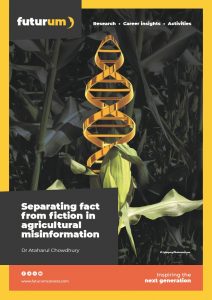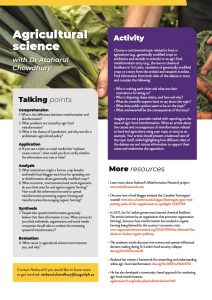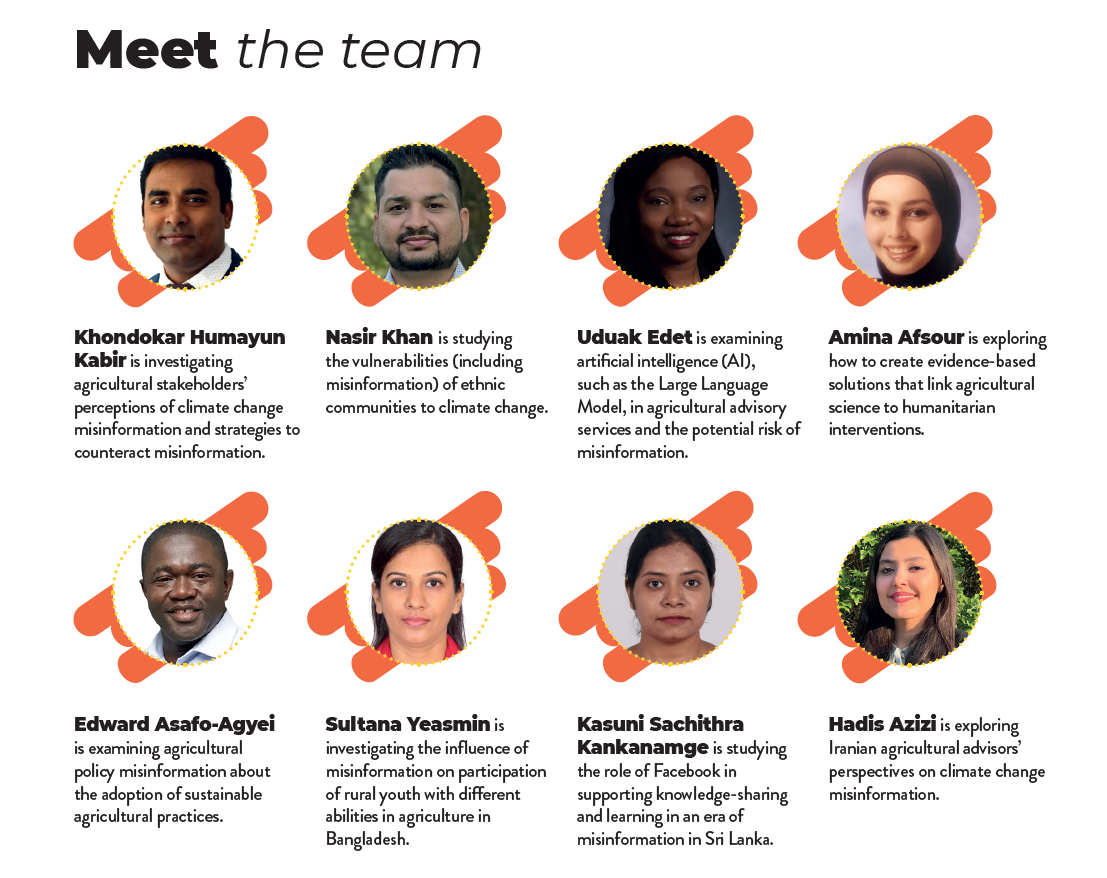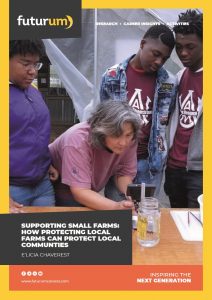Separating fact from fiction in agricultural misinformation
Social media is a hotbed of fake news and false claims about a huge range of topics. At the University of Guelph in Canada, Dr Ataharul Chowdhury is investigating the effects of food- and agriculture-related misinformation. He is training agri-food professionals to identify and combat this misinformation in the hope of improving food systems and farmers’ livelihoods.
Talk like an agricultural scientist
Agri-food — the sector that includes the primary production of food (e.g., crops, livestock), and the processing, distribution and consumption of food (e.g., rice, bread, milk) and non-food (e.g., leather, wax) agricultural products
Agronomist — an expert in crop production
Disinformation — false information deliberately shared with the intent to cause harm
Genetically modified crop — a plant with DNA that has been scientifically altered
Misinformation — false information that is believed to be true, shared without the intent to cause harm
Is organic farming better than non-organic farming? Should farmers feed antibiotics and steroids to their animals? Such debates about food and agriculture can result in false information being spread as people try to convince others of the ‘right’ point of view.
What is misinformation?
“Misinformation is fake or misleading information which is shared without the intention to cause harm,” explains Dr Ataharul Chowdhury, an agricultural scientist at the University of Guelph. “In contrast, disinformation is false information that is designed to harm people.” In today’s interconnected digital world, it is easier than ever for mis- and disinformation to spread. False claims shared on social media can rapidly become viral, especially if they trigger negative emotions such as fear or anger.
While misinformation is not intentionally harmful, it can have severe consequences. “Misinformation can create division among people,” explains Ataharul. “Polarisation on topics such as climate change and vaccines has damaged public trust in science, which makes it harder for scientists to serve society.”
What are the consequences of agri-food misinformation?
“Agri-food misinformation creates anxiety, uncertainty and confusion among farmers and consumers,” explains Ataharul. It reduces their ability to make science-based decisions on issues such as the effects of agriculture on the environment and the effects of food on health, which can lead to economic and health losses. Controversial topics such as genetically modified crops, organic farming and animal welfare are commonly surrounded by misinformation. While there are legitimate scientific debates on these topics, both sides use information that they believe to be true to promote their own personal, financial or political interests. However, this information may be false. Misinformation can affect everyone, from farmers who are sold poor quality seeds and fertilisers, to consumers who are led to buy unhealthy or unsustainable foods.
Examples of agri-food misinformation
Reference
https://doi.org/10.33424/FUTURUM502
In 1928, Soviet agronomist Trofim Lysenko claimed that crop yields could be increased by applying his theory of Lysenkoism, which rejected biological ideas of genetics and evolution. He believed that plants could be ‘educated’ to adapt to their environment. For example, simply exposing a plant to cold conditions would increase its resistance to the cold. The Soviet Union forcibly promoted Lysenkoism as it aligned with the country’s political ideology, but it had devastating consequences for agriculture. By forcing farmers to plant crops in unsuitable conditions, crop yields dramatically decreased, leading to a famine that cost millions of lives.
In 1958, Chinese farmers were ordered to kill sparrows in the belief that they were eating grain. However, with the sparrow population decimated, insects had far fewer predators and swarms of locusts devastated the fields, leading to one of the largest famines in human history.
Agri-food misinformation goes far beyond poor agricultural policies. Social media is awash with unfounded claims about the health benefits and drawbacks of different products, with some articles proclaiming that “soybean is the next superfood” while others warn that “soybean causes cancer”. In 2021, a food blogger claimed that Canadian butter had become harder to spread. She suggested this was because dairy farmers were adding palm oil supplements to their cow feed and this idea took off on social media. Thanks to the ‘buttergate’ scandal, sales of Canadian butter decreased, highlighting how easily misinformation can spread in the modern world, and how a seemingly small statement can have a national economic impact.
How is Ataharul combatting agri-food misinformation?
“Our first priority is to raise awareness of the issue among the scientific community, policymakers, advisory professionals, farmers and the public,” Ataharul explains. His Misinformation Research team is investigating cases of agri-food misinformation around the world and has created online resources to debunk common food and agriculture myths. The team is also developing training resources to educate agri-food professionals about the dangers of misinformation and to teach them how to recognise it.
How can you recognise mis- and disinformation?
With so much information available online, how can you separate fact from fiction? “The most important thing is to develop a critical mind when consuming information online,” advises Ataharul. “In today’s digital world, having critical media literacy skills is essential.” He suggests the following techniques for evaluating the credibility of online information:
- Who wrote the information? Research the author. Note that anonymous articles may be untrustworthy.
- Why did they write it? Think about author’s motives for sharing the information.
- How does it make you feel? If you read something that makes you angry, dig deeper. Disinformation often deliberately generates strong emotions and divisive opinions, so look for more information before believing an anger-inducing story.
- Who is sharing the information? Genuine stories should be reported by multiple sources. Research the website where you found the information. Note that blog articles on mainstream news sites are less likely to be fact-checked. Beware of websites with odd domain names, such as ending in ‘.com.co’ or ‘lo’, which may be fake versions of legitimate websites.
- What are the other perspectives? Read multiple sources to get different points of view on the topic. Do not just read articles that agree with your opinion.
If you suspect that something you read may be mis- or disinformation, do not engage with it online. If you do, you are only contributing to spreading fake news.
Misinformation is a relatively new topic of study in the field of agricultural science. Thanks to Ataharul’s research, we are starting to appreciate the scale of misinformation in the agri-food industry and to develop new ways of tackling it, so that our decisions around food and agriculture can continue to be guided by scientific evidence.
 Dr Ataharul Chowdhury
Dr Ataharul Chowdhury
School of Environmental Design and Rural Development, University of Guelph, Canada
Fields of research: Agricultural science, communication
Research project: Investigating how social media can strengthen agricultural communities of practice in an era of misinformation
Funder: Social Sciences and Humanities Research Council of Canada (SSHRC)
About agricultural science
Agricultural scientists are interested in the question of how to improve agriculture, such as how to produce more food for the world’s growing population while ensuring environmental sustainability and improving the livelihood of farmers. By incorporating ideas from biology, chemistry, economics, engineering and social science, agricultural scientists are developing better crop varieties, machinery, agricultural methods and food processing techniques. Those who work in agricultural advisory services (also known as agricultural extension) help farmers apply these new developments in real-world farming situations.
Agriculture faces many challenges in the 21st century, and agricultural scientists are leading the way in addressing them. Climate change is creating new and increasing difficulties for farmers, such as higher temperatures, increased flooding and changing soil conditions. At the same time, there are major problems around inequality. Small and medium sized farmers, particularly those in developing countries, find it increasingly difficult to compete with large corporations which control access to the latest technological developments. New technology-driven approaches to agriculture could help to address environmental sustainability, but they could also exacerbate the problems of inequality, something which Ataharul is working to prevent. Millions of people around the world rely on agriculture for their livelihoods, and the next generation of agricultural scientists will play a role in helping to alleviate rural poverty and ensure global food security.
Pathway from school to agricultural science
Studying biology, chemistry and mathematics at school might be a requirement for entering university agricultural science courses.
While at school, look for opportunities to get involved with agricultural activities, such as growing vegetables in a school garden, volunteering on a local farm, or working in a garden centre or horticultural nursery.
Meet like-minded people enthusiastic about agriculture by joining local, regional or national clubs, such as the Junior Farmers’ Association of Ontario (www.jfao.on.ca, in Canada), a Young Farmers’ Club (www.nfyfc.org.uk, in the UK) or the National Young Farmers Coalition (www.youngfarmers.org, in the US).
4-H (www.4-h.org) is a global organisation that promotes youth development by equipping young people with life and leadership skills. ‘Sustainable agriculture and food security’ is one of the key programmes in 4-H Canada (www.4-h-canada.ca).
A wide range of university degrees could lead to a career in agricultural science. These include agricultural science, plant science, horticulture, animal science, business management, environmental science and food science. All will equip you with the transferrable skills needed to understand and work with agricultural systems.
Explore careers in agricultural science
“Young people have many career opportunities in agricultural science,” says Ataharul. These include as a farmer, agricultural advisor, agronomist, research scientist, policymaker, educator or community development worker. This means you could find yourself working for a research organisation, NGO, government or university.
Most countries have national agricultural organisations, which conduct agricultural research and provide agricultural advice. There are also career opportunities in international organisations such as the Food and Agriculture Organization (www.fao.org/home/en), the International Fund for Agricultural Development (www.ifad.org/en), the Consultative Group for Agricultural Science (www.cgiar.org) and the Association for International Agricultural and Extension Education (www.aiaee.org).
The University of Guelph provides agricultural outreach opportunities for high school students through the College Royal (www.collegeroyalsociety.com) and Ontario Agricultural Science (www.uoguelph.ca/oac/liaison-program/educational-resources).
Meet Ataharul
I grew up on a family farm in Bangladesh and saw first-hand the challenges and opportunities faced by smallholders. I came to appreciate the culture, values and emotions associated with farming, and its importance as a means of livelihood. My father was a leader in a community development NGO that supported farming and rural communities in Bangladesh.
Despite my family’s expectation that I study engineering or medicine, I decided to pursue agricultural science. I was inspired by visiting NGO activities in rural Bangladesh, where I saw the positive impact of organising rural communities, amplifying their voices and enhancing their capacities for development.
I have studied and worked around the world which has given me the opportunity to observe how agricultural science and education are valued in different places. In developed countries, farming is often viewed as a corporate model with input and output mechanisms. However, in developing regions, farming is the primary source of livelihood for most of the population, with people relying on their local knowledge and innovation to succeed.
Unfortunately, agriculture is often overlooked by politicians and policymakers. Yet, we must remember that this profession has played a crucial role in advancing many scientific and economic domains. Therefore, we must advocate for increased public support of and investment in agricultural science and education.
Interdisciplinary studies are critical for connecting science with practice and for delivering knowledge to help farmers develop their capacities. Such support has been declining globally, forcing farmers to self-organise and rely on informal networks and digital services. This isolation can hinder innovation, so it’s important to draw attention to this issue and develop solutions that benefit farmers and their communities.
I am passionate about increasing the sustainability of agriculture in rural and resource-poor communities. Ensuring the sustainability of agriculture is crucial for our future well-being. Half of the global population depends on farming for their livelihoods. However, these communities often lack the resources to demand the necessary services from governments and service providers. Additionally, we have seen a significant increase in migration from rural areas to cities, making it increasingly difficult to attract the next generation of farmers who will grow our future food.
Ataharul’s top tips
1. Explore different opportunities and future pathways ahead – you don’t need to figure out everything now. Instead, welcome experiences as they come your way, even if they take you down an unexpected path.
2. Never give up on your goals, even though you might not reach them for a while.
3. Always try to cultivate positive energies and dissipate negative ones, as the latter will get you down and prevent you from reaching your goal.
Do you have a question for Ataharul?
Write it in the comments box below and Ataharul will get back to you. (Remember, researchers are very busy people, so you may have to wait a few days.)
Learn more about the challenges facing small, rural farms and how agriculture extension workers are supporting them:









0 Comments